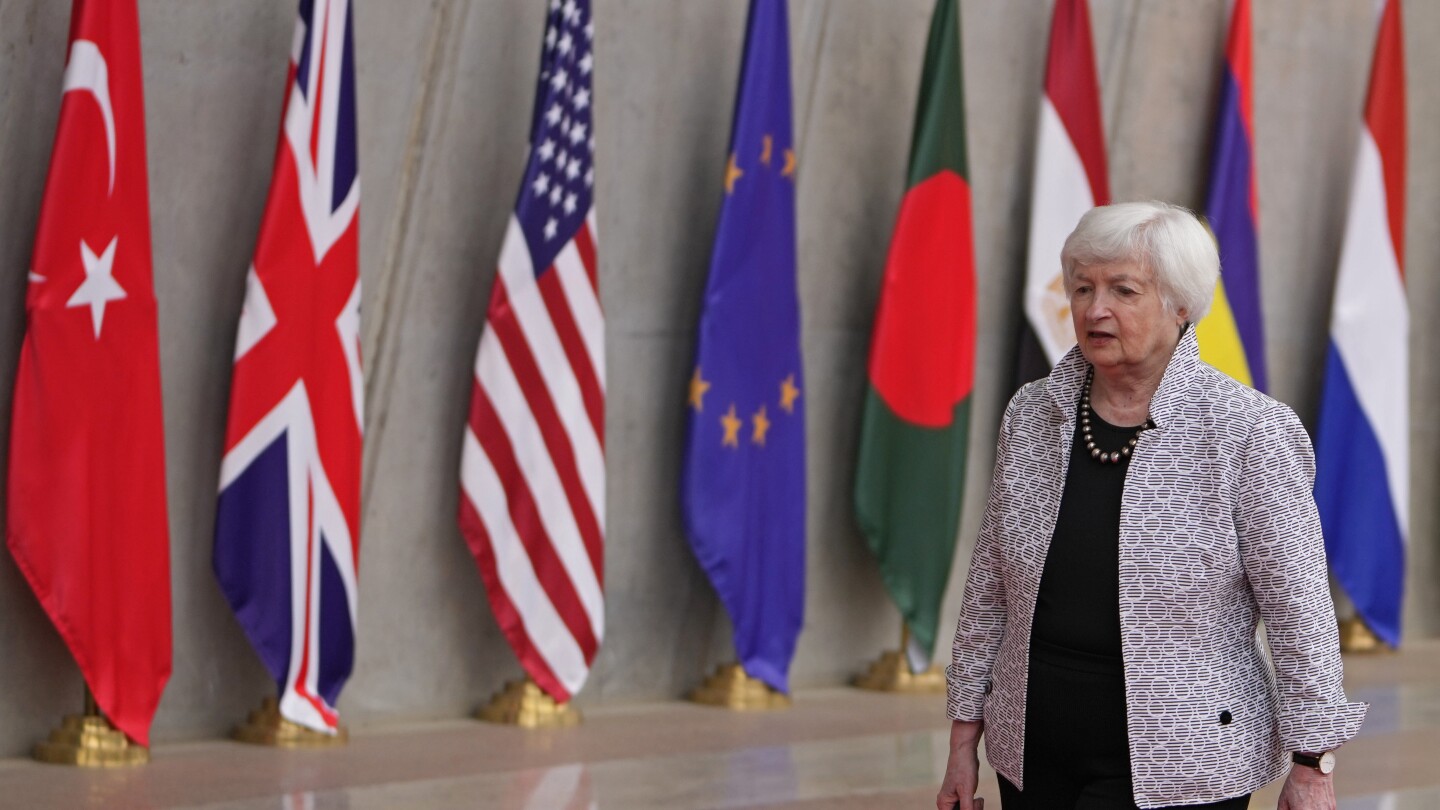WASHINGTON (AP) — Treasury Secretary Janet Yellen is facing growing skepticism from some leading rich and developing nations as the residual impact of sanctions against Russia is deepening divisions among the Group of 20 countries.
With world leaders and finance ministers meeting this week in India for the G20 summit, fractures have came into the open, and alliances are tightening among some nations that have long been resistant to the U.S.-led efforts to exact economic punishment on Moscow for its war in Ukraine.
The United States and its allies among the Group of Seven major industrial nations insist that the sanctions and a price cap on Russian oil have been successful at restricting revenue for the Russian economy, even though it grew, in a year-to-year comparison, by 4.9% in the second quarter of 2023.
Russia and China, meanwhile, have declared a “no limits” partnership of their own. And the economic bloc of Brazil, Russia, India, China and South Africa — known as BRICS — is trying to increase its use of local currencies instead of the U.S. dollar. Also likely to be seen at the G20 summit is budding closeness of U.S.-India ties in light of a shared concern about China’s military and economic assertiveness.
As President Joe Biden and Yellen visit New Delhi, they will have to navigate a more fragmented economic and political environment during difficult negotiations over securing food and energy supplies for developing countries.
Yellen’s trip, her fourth to India in less than a year, comes shortly after Russian President Vladimir Putin said a landmark deal that allowed Ukraine to export grain safely through the Black Sea during the war will not be restored until the West meets his demands on Moscow’s own agricultural exports.
Putin says that a parallel agreement promising to remove obstacles to Russian exports of food and fertilizer has not been honored. Russian officials also complain that restrictions on shipping and insurance hampered its agricultural trade, though it has shipped record amounts of wheat since last year.
Russia is hoping it can use its power over Ukraine’s Black Sea exports as a bargaining chip to reduce Western sanctions.
“It’s a combination of different factors that I think that makes it difficult for the G20 to work in concert in a way that they did in the past,” said Rachel Ziemba, an adjunct senior fellow at the Center for a New American Security. Those factors include the war in Ukraine and nations’ weaponizing currencies and commodities, she said.
“Something I imagine they can get behind is the importance of getting energy and food flowing and other food security issues for developing nations,” she said.
The Treasury Department said Yellen’s four-day trip will highlight “the importance of imposing severe costs on Russia and mitigating global spillovers.” Yellen will stress the consequences of the war, “including through the price cap, which has been achieving its dual goals of reducing Russian revenue while keeping global energy prices stable,” the department said.
Yellen also will focus her efforts on strengthening food security through changes to multilateral development banks and by replenishing the International Fund for Agricultural Development. That may be difficult as G20 nations increasingly gravitate into blocs and with some leaders, including Chinese President Xi Jinping, opting to skip the summit.
Josh Lipsky, senior director of the Atlantic Council’s GeoEconomics Center, said the meetings should be an opportunity to work at what the nations agree upon, including multilateral development bank issues and changes to debt restructuring.
“India has wanted to present itself as the convener of the world at a time of international fragmentation,” Lipsky said. “It will be harder to do with Xi not there.”
There are risks to greater factures in the global economy, according to an August International Monetary Fund report, which estimates that greater international trade restrictions could reduce global economic output by as much as 7% over the long term, or roughly $7.4 trillion.
Trade between China and Russia has swelled, due in large part to the impact of Western sanctions on Russia, as well as the price cap on Russian oil, which allows China and India to purchase energy from Russia at discounted prices. Still, China’s economy is facing an overall slump.
Mark Sobel, a senior adviser at the Center for Strategic and International Studies, said that despite Russian oil shipments being reoriented to China and India, the G7 anticipated “if it gave China and India greater scope to seek discounts on Russian oil, that meant less revenue for Russia and was consistent with the thrust of G7 actions.”
Sobel said the sanctions against Russia as well as other measures to curb Russian oil proceeds were “targeted and highly appropriate.”
Russia and China are increasingly trading in China’s yuan, which replaced the U.S. dollar as Russia’s most traded currency in early 2023.
The BRICS nations have agreed to expand trading in their local currencies to reduce reliance on the U.S. dollar. Critics in the developing world are increasingly uneasy about the U.S. ability to use the dollar’s worldwide influence to impose sanctions against its rivals, including Russia.
In 2015, the BRICS countries launched the New Development Bank as an alternative to the U.S. and European-dominated International Monetary Fund and World Bank.
“We have to be realistic about what this Group of 20 can accomplish,” Ziemba said, “but I do think there is a benefit of having a place where many of the biggest economies in the world meet, as a place to understand where their differences come from.”
Members of the G20 are the European Union and Argentina, Australia, Brazil, Britain, Canada, China, France, Germany, India, Indonesia, Italy, Japan, Mexico, Russia, Saudi Arabia, South Africa, South Korea, Turkey and the United States.

